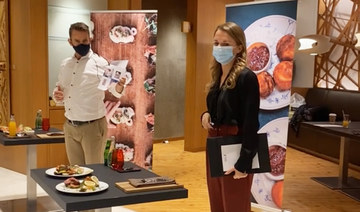RIYADH: As a Danish diplomat based in Saudi Arabia for two years, Camilla Fatum Stoltenberg has had a unique perspective of the sweeping reforms taking place across the Kingdom.
But for a woman from a liberal Scandinavian nation such as Denmark, it has been the changing roles of Saudi women that have resonated the most.
“I think the increased focus on improving women’s role in society in line with Vision 2030 has had the largest impact on the people in Saudi Arabia,” Stoltenberg told Arab News after recently leaving the Kingdom for her next job. “Due to Vision 2030, the discussions on the role of women and women themselves have become more visible in the Saudi Arabian society,” she said.
Stoltenberg worked as a political officer at the Embassy of Denmark in Riyadh. She covered political, economic and cultural developments in the Kingdom, Kuwait, Bahrain, Oman and Yemen.
In her role and personal life living in Riyadh she witnessed the many changes and developments implemented by Crown Prince Mohammed bin Salman’s Vision 2030 reform program.
From women being allowed to drive to the transformation in women’s roles in the workplace, Stoltenberg witnessed first-hand the immense female empowerment and social changes the country has gone through.
“I am happy that I have been able to experience two years of the impressive and important transformation that is taking place in Saudi Arabia. It is truly a historic time,” she said.
Stoltenberg, along with other expats who have attended conferences and seminars, has seen women leading discussions and inspiring future generations in the Kingdom.
She has also seen women launching many businesses that are now contributing to the growing private sector.
“I am pleased to see that many men and women acknowledge the benefits of improving women’s role in society and support the reforms,” Stoltenberg said.
One of the biggest initial changes for women came in September 2017 when King Salman announced the royal decree that would end the driving ban in the Kingdom. Soon after, Reema Juffali became Saudi Arabia’s first professional female racing car driver.
The changes have also had a large effect on the Danish community living in the Kingdom, as well as tourists visiting the country.
Female Danish residents can now freely navigate through the country in their cars.
“The lifting of the driving ban for women in June 2018 and the increased mobility have affected Danish female residents and my female friends and colleagues in a positive way,” Stoltenberg said.
She explained how tourism law changes in Saudi Arabia have affected the way the Danish community interacts with the Kingdom.
Tourist visas were launched in 2019, opening international tourism to more than 49 countries, allowing many Danes the opportunity to explore Saudi Arabia and visit their loved ones living and working in the Kingdom.
The easing of restrictions on women’s dress has also allowed expats more freedom and to not have to wear an abaya in public.
“Many Danish residents have enjoyed being able to go to the cinema, concerts and other entertainment activities which have been available as part of the Saudi Seasons,” Stoltenberg said in reference to a series of entertainment events.
Stoltenberg has been able to travel through the eastern province and to Jeddah, and discovered many similarities between the Danish and Saudi Arabian people in culture and hospitality.
“I found that Saudis are curious, very hospitable, friendly and helpful, she said. “I have often been greeted with a ‘welcome to Saudi Arabia’ in supermarkets, malls and restaurants.”
More broadly, Stoltenberg said that she was impressed with the reform steps taken in Saudi Arabia.
“I have experienced that there is a real will to change, and the pace of the reforms during the last two years is striking,” she said. “Change is never an easy task, and it will take time, but it has been very inspiring to meet the driven and passionate people in Saudi Arabia that are supporting and working toward reforming the country.”
Stoltenberg closely followed the conferences and events being led by Saudi women and hosted by the Danish embassy. The embassy hosted an event in January 2021 inviting many prominent female leaders in to exchange ideas.
“Women empowerment is high on the agenda in both Denmark and Saudi Arabia, and it was a great opportunity to share experiences, industry insights and ideas on how to overcome challenges and further improve the role of women,” Stoltenberg said.
Now based back in the Danish capital Copenhagen, she said that she looks forward to coming back to the Kingdom to see the changes that will take place in the future.
“My fondest memory of Saudi Arabia is a combination of the people I met, the different experiences I had, the places I visited, and the challenges and opportunities that come with leaving my comfort zone and being on unknown territory,” she said.
“I tell my friends and family that they should visit Saudi Arabia as soon as COVID-19 is over. Saudi Arabia has a lot to offer and experiencing the country, the people and the modernization progress first-hand has made a big impression on me, and I am sure it will on others too.”































